
Here Are The Most Common Enneagram Types For Each Myers-Briggs Personality Type
The Myers-Briggs Personality Inventory and the Enneagram of Personality make up two distinct yet highly complementary personality systems.
By ![]() Heidi Priebe
Heidi Priebe
The Myers-Briggs Personality Inventory and the Enneagram of Personality make up two distinct yet highly complementary personality systems.
The Enneagram inventory explains the influences of one’s basic fears and motivations and details each of the nine personality types’ route to self-actualization.
The Myers-Briggs personality inventory explains the cognitive processes of each of its sixteen personality types and explains how to harness and build upon one’s natural mental strengths.
In a recent survey, over 3000 participants indicated their Myers-Briggs personality types and their Enneagram types (including wings and instinctual variants if known). The compiled responses are as follows:
Guardians: ISTJ / ISFJ / ESTJ / ESFJ
Artisans: ISFP / ESFP / ISTP / ESTP
Rationals: INTJ / ENTJ / INTP / ENTP
Idealists: INFJ / ENFJ / INFP / ENFP
Cognitive Functions And The Enneagram
Note:
It is important to indicate that the compiled data was entirely based on self-report. Participants were not required to obtain a professional assessment of their type or display an understanding of type theory, therefore a large margin of error must be taken into account when reviewing the results.![]()
Heidi Priebe explains how your personality type will hook up, break up and everything else in between in her new book available here.
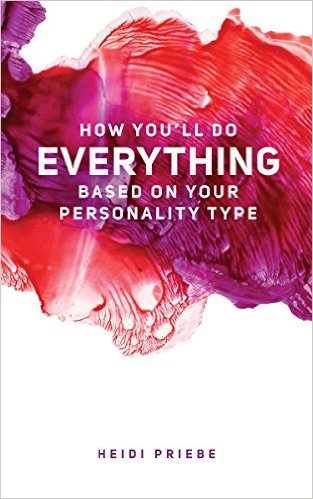
ISTJs And The Enneagram
Enneagram Type Distribution
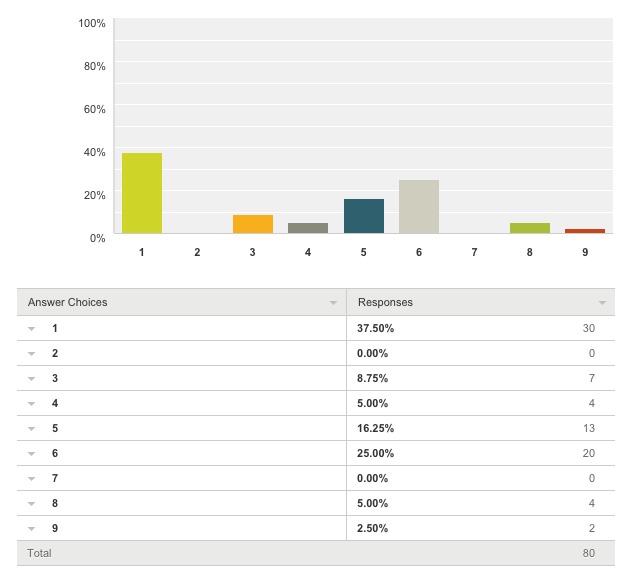
Type 1 ISTJs
Type 1 with a 9 wing: 54%
Type 1 with a 2 wing: 46%
The majority of ISTJs identified as Type 1s in the Enneagram inventory. Interestingly, the combination of auxiliary extroverted thinking and tertiary introverted feeling appears to be correlated with the 1 Enneagram type, as many ISTJs and INTJs identified this to be their type.
Type 1 ISTJs are the principled, justice-focused types who take it upon themselves to be upstanding citizen in their communities. They are likely to have strong, firm stances on a variety of moral issues, which they will defend tirelessly. This may lead them into conflict with others, but the type 1 ISTJ will see this as a necessary evil, as they consider it their personal duty in life to express and defend their values. Type 1 ISTJs may be mistaken by others to be Fi-dominant types, as they place such a heavy focus on morality and justice. They may also be mistaken for extroverts, as they are unafraid to speak up about what they believe to be right.
Type 6 ISTJs
Type 6 with a 5 wing: 100%
Type 6 with a 7 wing: 0%
A significant proportion of ISTJs identified as Type 6s in the Enneagram system. As introverted sensing is correlated with the 6 type, this pairing certainly fits. Type 6 ISTJs are highly security-oriented, and will go to almost any extreme to ensure the safety of themselves and the people they love. They are incredibly diligent and hard-working, remaining loyal to the companies, communities and institutions that they become entrenched in.
Type 6 ISTJs may occasionally be mistaken for ISFJs, as they are intensely loyal and committed to their loved ones – though in reality, that loyalty stems from a firm commitment they have made internally using their introverted feeling, not the function of extroverted feeling that is auxiliary for ISFJs.
Type 5 ISTJs
Type 5 with a 4 wing: 18%
Type 5 with a 6 wing: 82%
A sizeable portion of ISTJs selected 5 as their Enneagram type. Though type 5 is generally correlated with the cognitive function of introverted thinking, the combination of introverted sensing with extroverted thinking could certainly mimic the need to develop a thorough grasp on the way the world works.
Type 5 ISTJs are likely to place a heavy focus on their introverted sensing – wanting to pinpoint the best, most reliable information that is available to them in any situation. They will seek to understand the world on an intellectual level, and may not be quite as quick to act as other ISTJs – they first need to be sure that they are utilizing the proper means of accomplishing their goal. Type 5 ISTJs are likely to be mistaken by others as INTJs or INTPs due to their analytical nature. They may also mistype as INTJs, as they see themselves as incredibly analytical – not taking into account that Si is an analytical function in its own right.
ISTJ Instinctual Variants
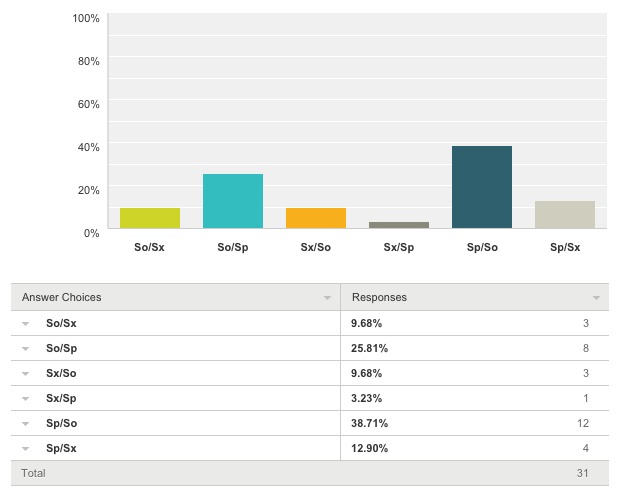
For further commentary on the cognitive functions as they relate to the instinctual variants of the Enneagram, click here. ![]()
Jump to:
Guardians: ISTJ / ISFJ / ESTJ / ESFJ
Artisans: ISFP / ESFP / ISTP / ESTP
Rationals: INTJ / ENTJ / INTP / ENTP
Idealists: INFJ / ENFJ / INFP / ENFP
Cognitive Functions And The Enneagram
ISTPs And The Enneagram
Enneagram Type Distribution:
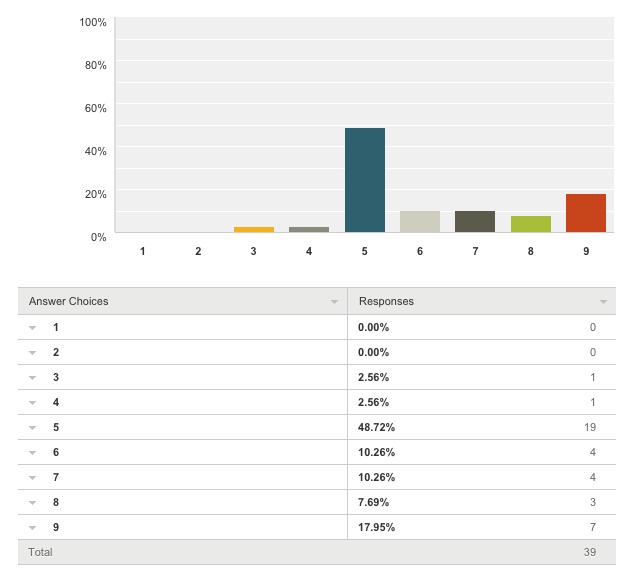
Type 5 ISTPs
Type 5 with a 4 wing: 31%
Type 5 with a 6 wing: 69%
An overwhelming number of ISTPs identified themselves as type 5s in the Enneagram system. Since dominant introverted thinking is highly correlated with the 5 type, this is little surprise. Both ISTPs and Type 5s are characterized by their love of learning, their critical/analytical thinking skills and their desire to examine a situation from every available angle prior to reaching a conclusion.
The Type 5 ISTP may find themselves particularly reliant on their introverted thinking and introverted intuition functions, and may find extroverted sensing to be somewhat of a blind spot, as they rarely feel comfortable acting until they have thoroughly scrutinized a given circumstance. This type of ISTP is most likely to be mistaken as an INTP by others, as they may be less quick to act upon their impulses than other Se-driven types. They may also misidentify as ISTJs while taking a dichotomy-driven test, as they may not act as impulsively as the ‘perceiver’ stereotype would imply.
Type 9 ISTPs
Type 9 with an 8 wing: 75%
Type 9 with a 1 wing: 25%
A substantial number of ISTPs identified themselves as type 9s in the Enneagram system. As the Enneagram type 9 is most heavily correlated with the introverted feeling function, this result was somewhat surprising. That being said, the ISTP’s inferior extroverted feeling may play a role in this classification, as the inferior-Fe user often fears that they will be unable to connect with others. As a result, they fear that they will experience disconnection and loss, and be unsure of how to reverse the situation.
Type 5 ISTPs may find they are particularly in touch with their extroverted sensing function, as it keeps them highly in tune with their surrounding environment. They may have a volatile relationship with their inferior extroverted feeling function, which demands harmony but is often difficult for the ISTP to manage due to its inferior position in their stacking. The Type 9 ISTP is likely to be highly sensitive to conflict in their external environment, picking up on it easily and wanting to avoid it at all costs. They are likely to use their introverted thinking function as a means of examining other people’s points of view in order to avoid conflict. They are most likely to be mistaken for ISFPs or INFPs, due to their desire for interpersonal peace and understanding.
Instinctual Variants:
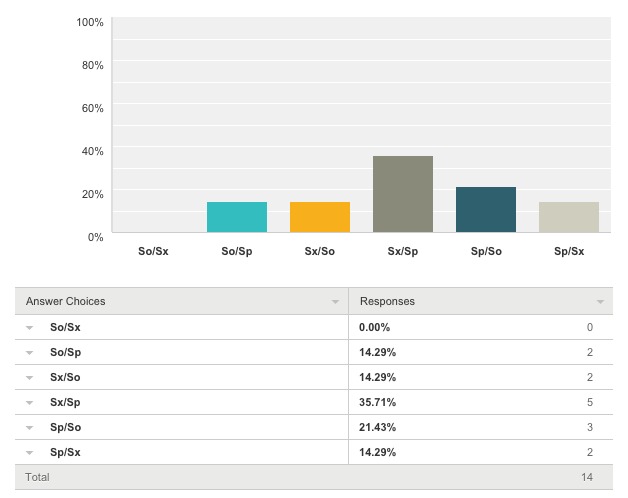
For further commentary on the cognitive functions as they relate to the instinctual variants of the Enneagram, click here. ![]()
Jump to:
Guardians: ISTJ / ISFJ / ESTJ / ESFJ
Artisans: ISFP / ESFP / ISTP / ESTP
Rationals: INTJ / ENTJ / INTP / ENTP
Idealists: INFJ / ENFJ / INFP / ENFP
Cognitive Functions And The Enneagram
ESTPs And The Enneagram
Enneagram Type Distribution:
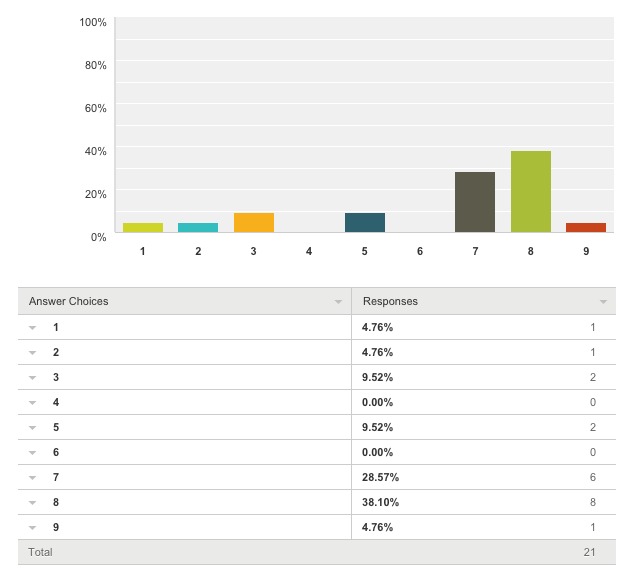
Type 8 ESTPs
Type 8 with a 7 wing: 72%
Type 8 with a 9 wing: 28%
The majority of ESTPs identified themselves as type 8s in the Enneagram system. Though the 8 type is most strongly correlated with the extroverted thinking function, the combination of extroverted sensing and introverted thinking produce a similarly assertive and straightforward method of interacting with one’s environment. Therefore, it makes sense that many ESTPs identify with the 8 type.
Type 8 ESTPs are likely to have a fairly even balance between their extroverted sensing introverted thinking functions – the combination of which allows them to pursue their goals in a confident and straightforward manner. This type may find extroverted feeling to be their blind spot, as type 8s tend to look down on any expression of weakness in others. Others are likely to mistake type 8 ESTPs for ESTJs or ENTJs as their no-nonsense attitude mimics extroverted thinking. The type 8 ESTP may also misidentify themselves as an ESTJ if they are looking at the MBTI from a dichotomous standpoint, as their straightforward attitude resembles a ‘judger’ trait when cognitive functions are not considered.
Type 7 ESTPs
Type 7 with a 6 wing: 0%
Type 7 with an 8 wing: 100%
A significant number of ESTPs identified themselves as type 7s in the Enneagram system. As extroverted sensing is heavily correlated with the 7 type, it makes sense that many members of this Se-dominant type fall into the 7 category. Type 7 ESTPs are often bold, courageous adventurers. They are likely to be risk-takers and rule-breakers, who are ceaselessly interested in the pursuit of the next physical challenge.
Others may mistake type 7 ESTPs for ESFPs, as their zest for life can resemble that of a feeling type’s. This type may also misidentify him or herself as an ENTP, as their excitable yet analytical nature can mimic extroverted intuition in many ways.
Instinctual Variants:
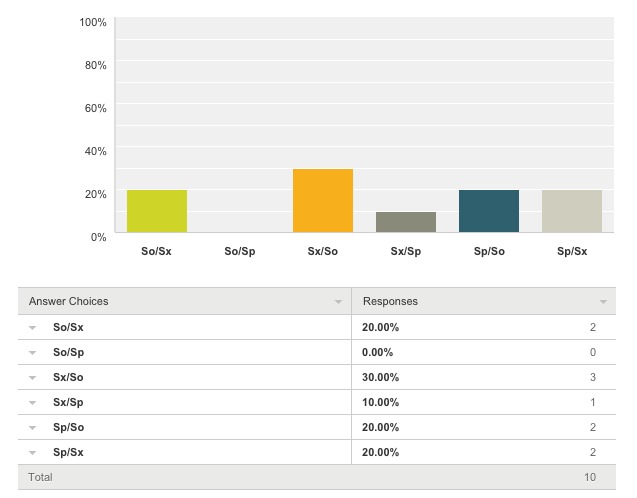
For further commentary on the cognitive functions as they relate to the instinctual variants of the Enneagram, click here. ![]()
Jump to:
Guardians: ISTJ / ISFJ / ESTJ / ESFJ
Artisans: ISFP / ESFP / ISTP / ESTP
Rationals: INTJ / ENTJ / INTP / ENTP
Idealists: INFJ / ENFJ / INFP / ENFP
Cognitive Functions And The Enneagram
ESTJs And The Enneagram
Enneagram Type Distribution:
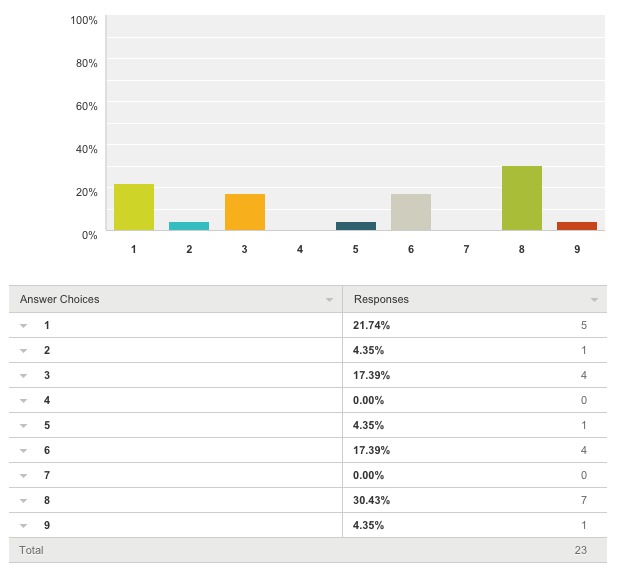
Type 8 ESTJs
Type 8 with a 7 wing: 100%
Type 8 with a 9 wing: 0%
The majority of ESTJs identified themselves as 8s in the Enneagram system. As the 8 type is highly correlated with the extroverted thinking function, it follows that most ESTJs would identify as such.
Type 8 ESTJs are likely to be both keenly aware and in control of their external environments at all times. They will feel most comfortable when they are in positions of power, be it at work, in relationships or in social situations. They may present a more boisterous and assertive version of the ESTJ personality, as they are quick to assert their dominance at all times. This type of ESTJ shares the ambitious spirit of the type 3 ESTJ, but their end goal is power rather than recognition. They fear being out of control, and wish to rise to the top to ensure that they can maintain complete autonomy.
The type 8 ESTJ may mistype or be mistaken by others for an ENTJ, as their desire for dominance drives them to access their extroverted intuition and come up with creative, unrivalled methods of getting things done. This type wants to constantly be one step ahead of the game, though this is a product of their extroverted thinking working with extroverted intuition, rather than introverted intuition.
Type 3 ESTJs
Type 3 with a 2 wing:
Type 3 with a 4 wing:
A substantial number of ESTJs identified as type 3s in the Enneagram system. As type 3 is also correlated with the ESTJ’s dominant function of extroverted thinking, this pairing fits well.
Type 3 ESTJs are likely to be highly ambitious, work-oriented individuals. They will be incredibly focused on whichever goals they’ve set for themselves, approaching them steadily and confidently over time. Unlike their type 8 counterparts, the type 3 ESTJ is unlikely to be overly concerned with acquiring power for the mere sake of having it. They see their goals as their way of fitting into (and excelling at) whichever societal rules they have internalized growing up. So long as their families, community members and loved ones are happy and impressed with the type 3 ESTJ – and so long as the ESTJ has adequate means to acquire the resources they desire – they feel fulfilled.
Others may mistake the type 3 ESTJ for an ISTJ, as they appear less aggressive and dominant than their type 8 counterparts. They may also mistype as an ENTJ during assessments, as their forward-thinking nature may cause them to believe they are an N type – when in reality, it is the combination of extroverted thinking’s logic and introverted sensing’s need for security that is causing them to consider the long-term implications of their actions.
Type 1 ESTJs
Type 1 with a 9 wing: 0%
Type 1 with a 2 wing: 100%
A moderate number of ESTJs identified 1 as their Enneagram type. As this type is correlated with the ESTJ’s auxiliary function of introverted sensing, it fits that a number of ESTJs would fall into the type 1 Enneagram category.
Type 1 ESTJs are likely to be upstanding citizens in their community – internalizing the values they grew up with and wanting to uphold them at all costs. They are likely to pursue positions of influence in their communities, rising naturally into leadership roles. These ESTJs may come across as particularly opinionated, as they have a clear, distinct vision of how things ought to be run and are they unafraid of advocating for their visions.
This type of ESTJ is most similar to their introverted counterpart the ISTJ, in that they stick firmly to their internal set of morals, and may be more in touch with their inferior introverted feeling than their type 8 or type 3 counterparts.
Instinctual Variants:
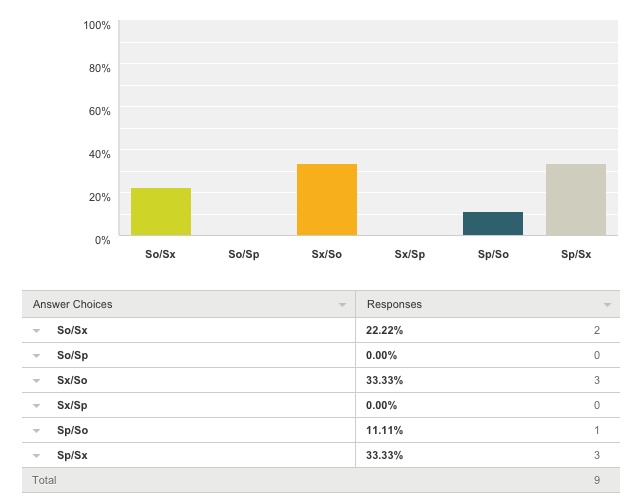
For further commentary on the cognitive functions as they relate to the instinctual variants of the Enneagram, click here. ![]()
Jump to:
Guardians: ISTJ / ISFJ / ESTJ / ESFJ
Artisans: ISFP / ESFP / ISTP / ESTP
Rationals: INTJ / ENTJ / INTP / ENTP
Idealists: INFJ / ENFJ / INFP / ENFP
Cognitive Functions And The Enneagram
INTJs And The Enneagram
Enneagram Type Distribution:
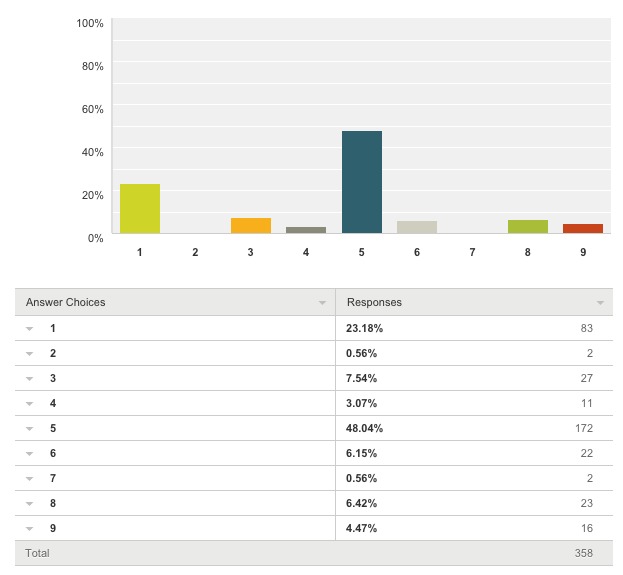
Type 5 INTJs
Type 5 with a 4 wing: 43%
Type 5 with a 6 wing: 57%
A significant proportion of INTJs identified 5 as their Enneagram type. Though this type is most strongly correlated with the introverted thinking function, the INTJ’s combination of introverted intuition and extroverted thinking mimics the introverted thinker’s desire for a comprehensive logical understanding of the world around him or her. Therefore, it fits that many INTJs fall under the type 5 category.
Type 5 INTJs rely heavily on their dominant function, introverted intuition – preferring to wait until they have a comprehensive understanding of a situation before taking action on it. These INTJs are, almost without exception, avid independent researchers. They take everything they read or hear about with a grain of salt – distrusting everything right down to the physical world that surrounds them until they have independently assessed it from every possible angle.
At their core, this type believes that their self-worth is dependent upon their competence and capability. They are constantly moving away from feelings of helplessness and incompetence, and toward feelings of understanding and capability.
The type 5 INTJ is most similar to the INTP, who shares their desire to logically examine the world from every available angle.
Type 1 INTJs
Type 1 with a 9 wing: 66%
Type 1 with a 2 wing: 34%
Type 1 INTJs are highly motivated by their tertiary introverted feeling – using the values and morals they have internalized to help them conceptualize personal and external ideals. Their introverted intuition allows them to constantly develop a vision of how both they and the world around them could function in an optimally virtuous way. They then use their auxiliary extroverted thinking to move closer to these ideals. Fittingly, the 1 type is correlated with the auxiliary Te/tertiary Fi axis.
The type 1 INTJ tends to hold themselves and others to exceptionally high standards, as they are constantly striving toward self-improvement. They are likely to be more perfectionistic than their type 5 counterparts, as they want to see their specific ideals realized, and they rely heavily on their extroverted thinking to make those ideals a reality.
At their core, this type believes that their self-worth is dependent upon their personal integrity. They are constantly moving away from feelings of corruption and toward feelings of moral virtuousness.
The type 1 INTJ is most similar to the ISTJ, who shares their desire to uphold themselves and their communities in an honorable fashion.
Instinctual Variants:
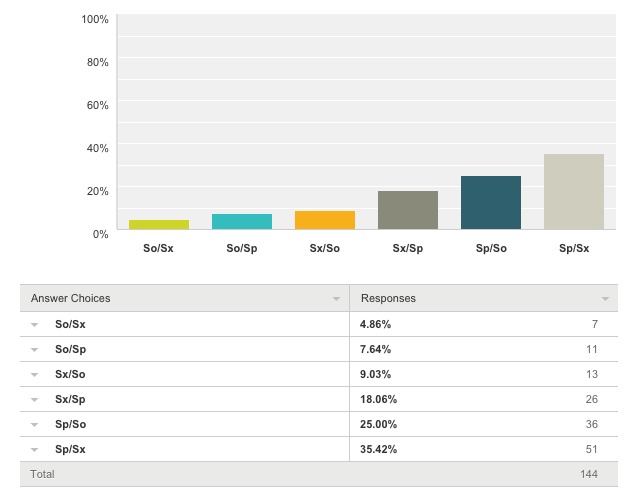
For further commentary on the cognitive functions as they relate to the instinctual variants of the Enneagram, click here. ![]()
Jump to:
Guardians: ISTJ / ISFJ / ESTJ / ESFJ
Artisans: ISFP / ESFP / ISTP / ESTP
Rationals: INTJ / ENTJ / INTP / ENTP
Idealists: INFJ / ENFJ / INFP / ENFP
Cognitive Functions And The Enneagram
ENTJs And The Enneagram
Enneagram Type Distribution
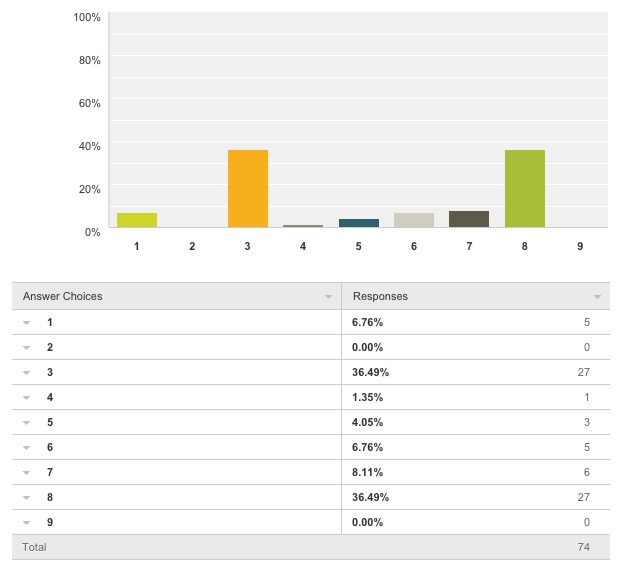
Type 8 ENTJs
Type 8 with a 7 wing: 90%
Type 8 with a 9 wing: 10%
A significant portion of ENTJs identified 8 as their Enneagram. The Enneagram type8 is correlated with the ENTJ’s dominant function of extroverted thinking, so this connection is unsurprising.
Type 8 ENTJs are highly ambitious and enjoy being on top – but this attitude extends beyond the workplace. They will feel most comfortable when they are in positions of power not only at work but also in relationships and social situations. They are quick to assert themselves and establish their dominance at all times – making them a slightly more aggressive version of the ENTJ personality.
Though this type gives off an intimidating air – and they like it that way – they are also generous and diligent providers for the people they are close to. This type prides themselves on their ability to independently care for both themselves and their loved ones.
At their core, the type 8 ENTJ believes that their self-worth is dependent upon their ability to stay in control of their circumstances. They are constantly moving toward autonomy and away from any feeling of being externally controlled or manipulated.
The type 8 ENTJ is most similar to the ESTJ personality, as their focus is predominantly on their extroverted thinking.
Type 3 ENTJs
Type 3 with a 2 wing: 60%
Type 3 with a 4 wing: 40%
A sizeable portion of the ENTJ population selected 3 as their Enneagram type. Since this type is also heavily correlated with the ENTJ’s lead function of extroverted thinking, this is an unsurprising link.
Type 3 ENTJs are intensely focused on long-term goals and plans. Like their type 8 counterparts, this type aims to establish themselves in positions of authority in whichever field of work they pursue. Unlike the type 8, however, the type 3 ENTJ sees power as an instrument rather than an end in itself. They wish to rise to the top because they are driven by a strong inner compass that tells them their self-worth is dependent upon their accomplishments.
This type of ENTJ may be more dependent upon their introverted intuition than their type 8 counterparts. Rather than consulting Ni solely as a means of manipulating their circumstances, they will consult their auxiliary function as a means of forming long-term plans and optimizing their ideas and plans. For this reason, this type is most similar to the INTJ personality.
Type 3 ENTJs are constantly moving toward success – however success is defined by the culture or society they live in – and away from feelings of insignificance and worthlessness.
Instinctual Variants
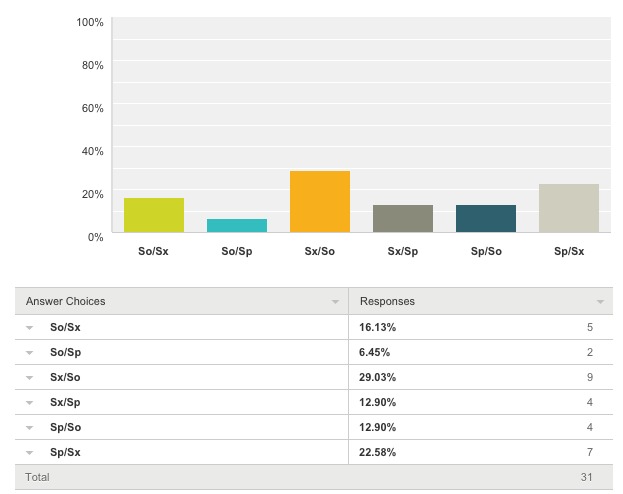
For further commentary on the cognitive functions as they relate to the instinctual variants of the Enneagram, click here. ![]()
Jump to:
Guardians: ISTJ / ISFJ / ESTJ / ESFJ
Artisans: ISFP / ESFP / ISTP / ESTP
Rationals: INTJ / ENTJ / INTP / ENTP
Idealists: INFJ / ENFJ / INFP / ENFP
Cognitive Functions And The Enneagram
INTPs And The Enneagram
Enneagram Type Distribution
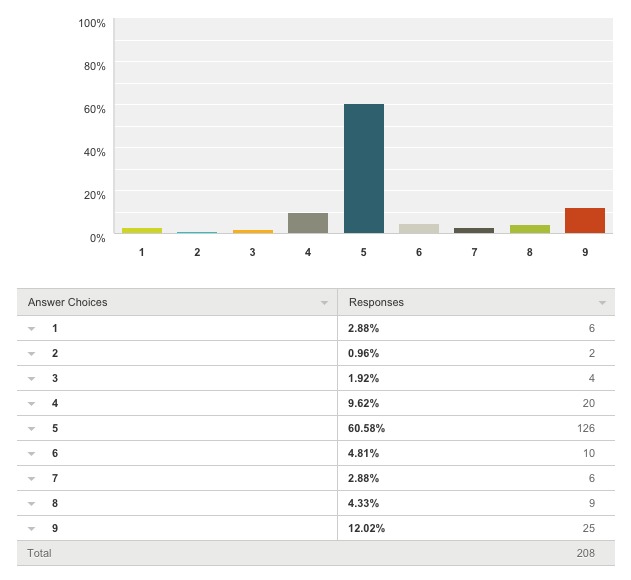
Type 5 INTPs
An overwhelming majority of INTPs selected 5 as their Enneagram type. As this type is correlated with the INTP’s dominant function of introverted thinking, this is unsurprising.
Both the INTP personality type and the 5 Enneagram type share a desire to understand the world around them in as accurate and logical a fashion as possible. Both types are known for their inherent distrust of the physical world that surrounds them – believing that nothing can be confirmed to be true until it is first analyzed, tested and thoroughly understood.
Type 5 with a 4 wing: 55%
Type 5 INTPs with a 4 wing place a strong reliance on their extroverted intuition as well as their introverted thinking. They are motivated not just to determine how things are, but to also ceaselessly consider how things could be. They are often vividly imaginative and open to profoundly strange theories and thoughts. This type is excited by the seemingly endless onslaught of possibilities that reality presents its experiencer with, and wants to examine as many of them as possible. They may be particularly partial toward recreational drug use, compared to their 5w6 counterparts. This type may bear more of a resemblance to INFP than any other type.
Type 5 with a 6 wing: 45%
Type 5 INTPs with a 6 wing place a stronger reliance on their introverted thinking and introverted sensing than on their extroverted intuition. While they certainly use Ne to consider various possibilities, they prefer narrowing down what is accurate and true to endlessly exploring what could be. This type is more security-oriented than their 5 wing 4 counterparts and may be partial to more traditional and stable career paths. This type takes particular care to ensure that they are always accessing the most accurate and trustworthy information, from the most reliable sources. This type may bear more of a resemblance to the INTJ than any other type.
Ultimately, type 5 INTPs believe that their self-worth is dependent upon their competence. They are constantly moving away from ignorance and toward understanding.
Instinctual Variants:
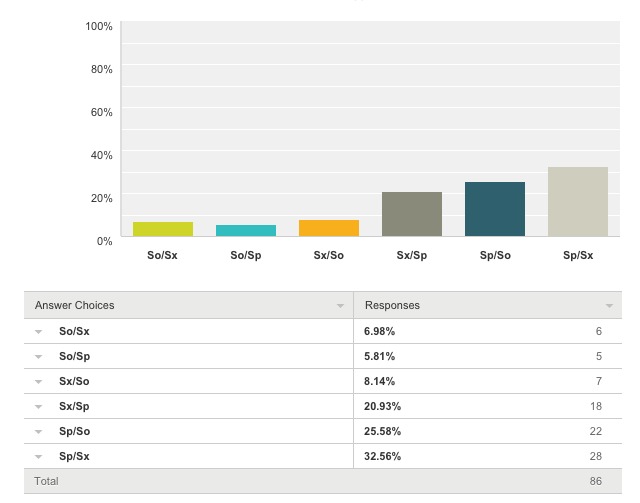
For further commentary on the cognitive functions as they relate to the instinctual variants of the Enneagram, click here. ![]()
Jump to:
Guardians: ISTJ / ISFJ / ESTJ / ESFJ
Artisans: ISFP / ESFP / ISTP / ESTP
Rationals: INTJ / ENTJ / INTP / ENTP
Idealists: INFJ / ENFJ / INFP / ENFP
Cognitive Functions And The Enneagram
ENTPs And The Enneagram
Enneagram Type Distribution
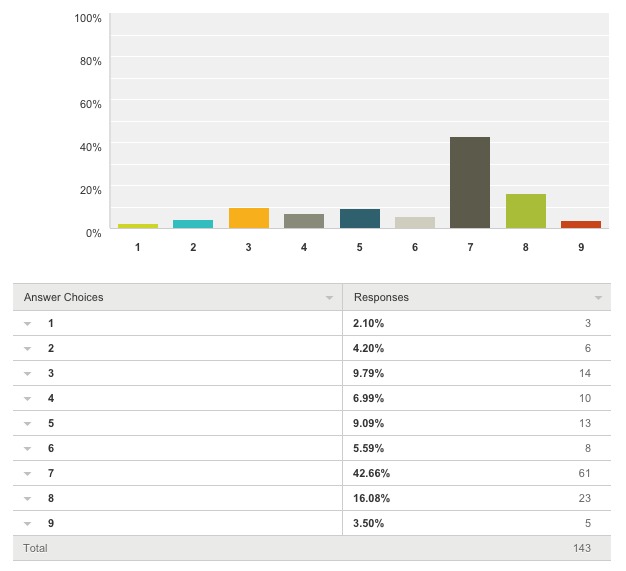
Type 7 ENTPs
Type 7 with a 6 wing: 27%
Type 7 with an 8 wing: 73%
An overwhelming number of ENTPs identified 7 as their Enneagram type. As this type is heavily correlated with the ENTP’s dominant function of extroverted intuition, this pairing certainly fits.
Type 7 ENTPs tend to be energetic, explorative and wildly imaginative – placing a heavy emphasis on their extroverted intuition and preferring the pursuit of new ideas to their corresponding follow-through. This type of ENTP is likely to jump from experience to experience throughout the course of their lives – harnessing their natural entrepreneurial skills to cultivate unique opportunities for themselves that deviate from the societal norm. They are highly independent and dislike being constrained, but they have less of a desire to control the world around them than their type 8 counterparts. Rather, they enjoy manipulating their environments for fun, and as a means of avoiding stagnancy.
At their core, type 7 ENTPs are driven by the fear of becoming trapped, stuck or stagnant in their lives. They are constantly moving away from deprivation and toward variety and abundance. These ENTPs are most similar to their sensory-oriented cousin, the ESTP.
Type 8 ENTPs
Type 8 with a 7 wing: 90%
Type 8 with a 9 wing: 10%
A moderate number of ENTPs identified 8 as their Enneagram type. Though this type is most strongly correlated with the extroverted thinking function, the combination of extroverted intuition and introverted thinking can mimic the expression of extroverted thinking in many ways – for this reason, it is unsurprising that many ENTPs identify 8 as their type.
Type 8 ENTPs are often highly entrepreneurial and industrious – harnessing the ingenuity of their extroverted intuition and the focus of their introverted thinking to dominate over competitors in the work force. These ENTPs come across as more assertive than their type 7 counterpoints, simply because they tend to be more focused on what they want. They are quick to establish dominance in social situations and prefer for the power dynamic to always be in their favor. Though both types dislike being constrained, the type 8 ENTP actually has an intense fear of being constrained, whereas the type 7 ENTP simply finds it highly unpleasant.
At their core, type 8 ENTPs are driven by the fear of being controlled or manipulated by others. They strive for power as a means of maintaining complete autonomy and are behaviourally most similar to the ENTJ personality.
Instinctual Variants:
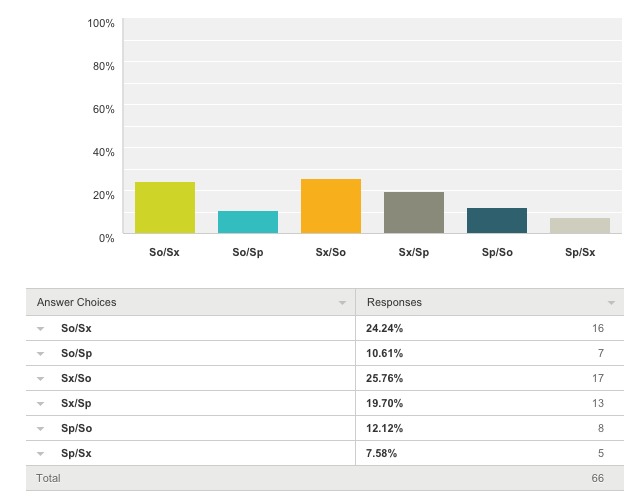
For further commentary on the cognitive functions as they relate to the instinctual variants of the Enneagram, click here. ![]()
Jump to:
Guardians: ISTJ / ISFJ / ESTJ / ESFJ
Artisans: ISFP / ESFP / ISTP / ESTP
Rationals: INTJ / ENTJ / INTP / ENTP
Idealists: INFJ / ENFJ / INFP / ENFP
Cognitive Functions And The Enneagram
ISFJs And The Enneagram
Enneagram Type Distribution:
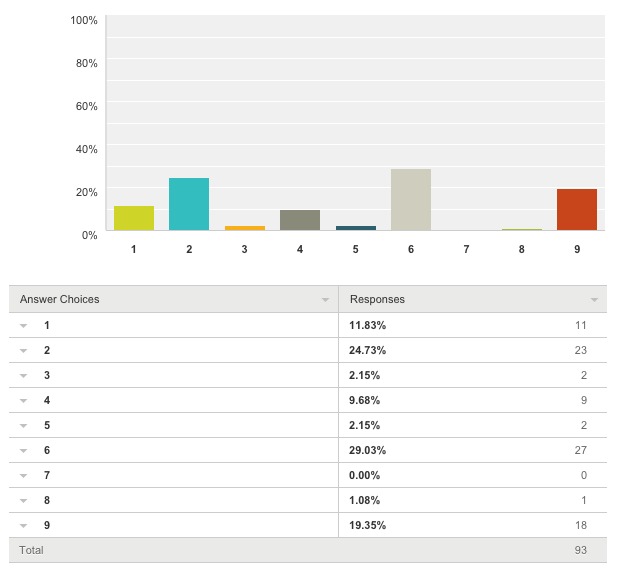
Type 6 ISFJs
Type 6 with a 5 wing: 81%
Type 6 with a 7 wing: 19%
A large proportion of ISFJs identified 6 as their Enneagram type. As the 6 type is correlated with the ISFJ’s dominant function introverted sensing, this pairing certainly fits.
Type 6 ISFJs are highly security-oriented. Their core fear is that they are unable to provide for themselves and so they are incredibly loyal and diligent to people around them – believing that having strong social support will bring them security. For this reason, many ISFJ type 6s may rely heavily on their extroverted feeling as a means of establishing and maintaining social support. This may cause others to perceive them as more extroverted than they truly are.
Type 6 ISFJs place a strong trust in societal institutions and organizations – which is exaggerated by their dominant introverted sensing function. They are likely to seek out jobs, affiliations and group memberships that are long lasting and mutually reciprocal. They are incredibly loyal to the institutions they involve themselves in, deriving a sense of security from the consistency of their involvement. Type 6 ISFJs are constantly moving away from feelings of inadequacy and toward feelings of support and guidance. They most closely resemble their ISTJ cousins, in that they are diligent, hardworking and loyal as a rule.
Type 2 ISFJs
Type 2 with a 1 wing: 44%
Type 2 with a 3 wing: 56%
A significant number of ISFJs selected 2 as their Enneagram type. As this type is heavily correlated with the ISFJ’s auxiliary function extroverted feeling, this type pairing certainly fits.
Type 2 ISFJs are highly invested in their immediate communities and personal relationships. They believe themselves to be worthy only insofar as they are of service to others – social reciprocity is their main survival tool and they feel the least anxious when they are helping others in some form.
This type of ISFJ is particularly generous and giving toward others. They often take on caregiving or teaching roles within their community and may come across as significantly more extroverted than they truly are. Though all ISFJs are occasionally guilty of over-extending themselves socially, this is a common occurrence for type 2 ISFJs.
Type 2 ISFJs are constantly moving away from feelings of uselessness and toward feelings of acceptance and love from others. They most closely resemble their extroverted counterpart, the ESFJ.
Type 9 ISFJs
Type 9 with an 8 wing: 17%
Type 9 with a 1 wing: 83%
A decent proportion of ISFJs identified 9 as their Enneagram type. Though the 9 type is most closely associated with the introverted feeling function, it shares many traits with the ISFJ’s auxiliary function, extroverted feeling.
Both ISFJs and Enneagram type 9s share a deep craving for interpersonal harmony. ISFJs who identify as type 9s may be particularly affected by conflict in their external environments, quickly identifying tension with their extroverted feeling and seeking to avoid its negative consequences by any means. These ISFJs are also more likely to be deeply in touch with their spiritual side – feeling genuinely, personally connected to a higher power, rather than just dutifully committed to their spiritual practice of choice.
At their core, type 9 ISFJs believe that they are only worthy insofar as they are peaceful and in tune with themselves and others. They are constantly moving away from feelings of loss or separation from others and toward feelings of harmony, unity and peace.
Instinctual Variants:
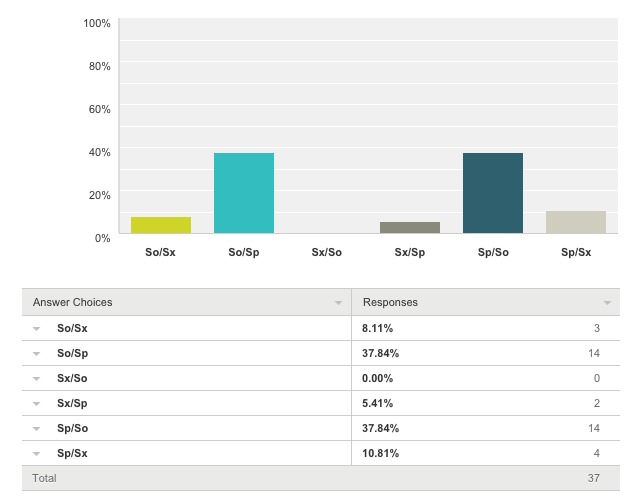
For further commentary on the cognitive functions as they relate to the instinctual variants of the Enneagram, click here. ![]()
Jump to:
Guardians: ISTJ / ISFJ / ESTJ / ESFJ
Artisans: ISFP / ESFP / ISTP / ESTP
Rationals: INTJ / ENTJ / INTP / ENTP
Idealists: INFJ / ENFJ / INFP / ENFP
Cognitive Functions And The Enneagram
ISFPs And The Enneagram
Breakdown Of Enneagram Types For ISFP Respondents:
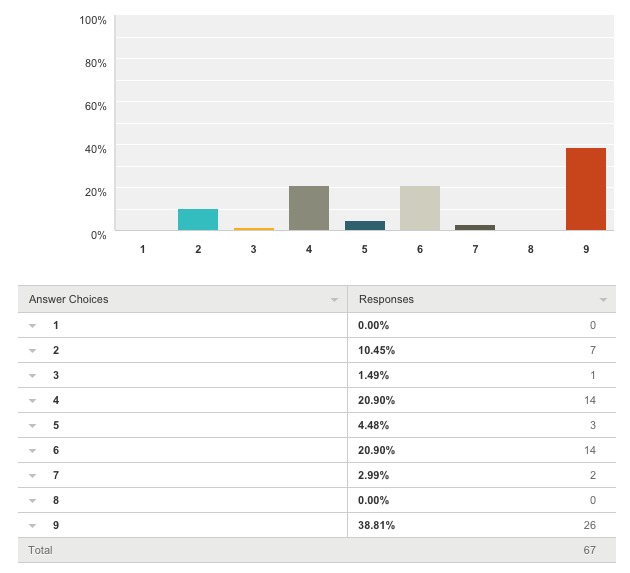
Type 9 ISFPs
Type 9 with an 8 wing: 24%
Type 9 with a 1 wing: 76%
The most common Enneagram type selected by ISFPs was 9. As the 9 type is highly correlated with the ISFP’s dominant function introverted feeling, this type pairing certainly fits.
Type 9 ISFPs crave personal and interpersonal peace above all else – they are highly receptive to the energies that surround them and may have a tendency to take on others’ energies as their own – embodying many of the traits of an empath or a highly sensitive person.
Type 9 ISFPs tend to be spiritual in nature – feeling as though their identity is, in some part, tied into a power that is greater than themselves (be this a religion, a spiritual practice or a strong belief in destiny). This type of ISFP tends to be quite in touch with their tertiary introverted intuition, using it support and understand better their dominant introverted feeling.
At their core, type 9 ISFPs believe themselves to be worthy insofar as they are in tune with both the world and people around them and their own inner world. They are constantly moving away from feelings of loss or disconnection and toward a greater sense of unity and harmony. This type is most like their introverted counterpart the INFP, but may mistake themselves for INFJs in high frequency, due to their well-developed introverted intuition, and because the combination of introverted feeling and extroverted sensing mimics extroverted feeling in many ways.
Type 4 ISFPs
Type 4 with an 3 wing: 14%
Type 4 with a 5 wing: 86%
A significant number of ISFPs identified 4 as their Enneagram type. Since the 4 type is correlated with the ISFP’s dominant function introverted feeling, this type pairing certainly fits.
Type 4s ISFPs are highly creative, individualistic and artistic in nature. They experience life on a deeply emotional level and are constantly searching for methods of expressing their experiences artistically and authentically. Many ISFP type 4s are talented artists, writers, musicians or other creative types. They see self-expression as their mission in life – believing it to be their purpose to share their gift of insight with others. These ISFPs may be particularly in tune with their auxiliary extroverted sensing as well as their introverted feeling, using a fusion of the two functions to create their art form of choice.
At their core, type 4 ISFPs believe themselves to be worthy only insofar as they are creatively unique. They are constantly moving away from feelings of insignificance and toward feelings of individuality and creativity. They are most like their intuitive cousins, the INFPs.
Type 6 ISFPs
Type 6 with an 5 wing: 71%
Type 6 with a 7 wing: 29%
A significant number of ISFPs identified 6 as their Enneagram type. Though this type is commonly associated with the introverted sensing function, the ISFP’s inferior extroverted thinking may be a key factor that plays into the 6’s core need for guidance.
Type 6 ISFPs are significantly more security-oriented than their type 9 or type 4 counterparts. They are less likely to jump from various projects and careers, preferring to stay loyal to the specific establishments and people they invest themselves in. Though they are deeply creative and passionate within the careers and relationships they choose, they prefer depth to breadth in both instances.
This type is likely to place a strong emphasis on their introverted feeling, taking their personal relationships very seriously, as long-term romantic relationships in particular bring them a sense of stability. At their core, type 6 ISFPs fear that they will be left without support or guidance from others – they are consequently always moving toward security and away from isolation. They most closely resemble the ISFJ and may misidentify themselves as such.
Instinctual Variants:
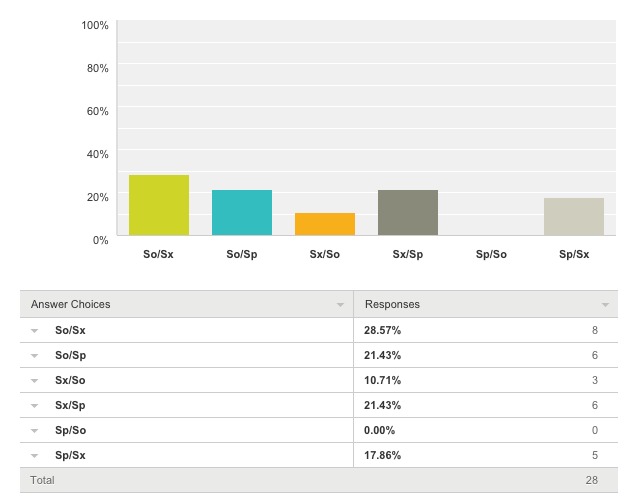
For further commentary on the cognitive functions as they relate to the instinctual variants of the Enneagram, click here. ![]()
Jump to:
Guardians: ISTJ / ISFJ / ESTJ / ESFJ
Artisans: ISFP / ESFP / ISTP / ESTP
Rationals: INTJ / ENTJ / INTP / ENTP
Idealists: INFJ / ENFJ / INFP / ENFP
Cognitive Functions And The Enneagram
ESFJs And The Enneagram
Enneagram Type Distribution
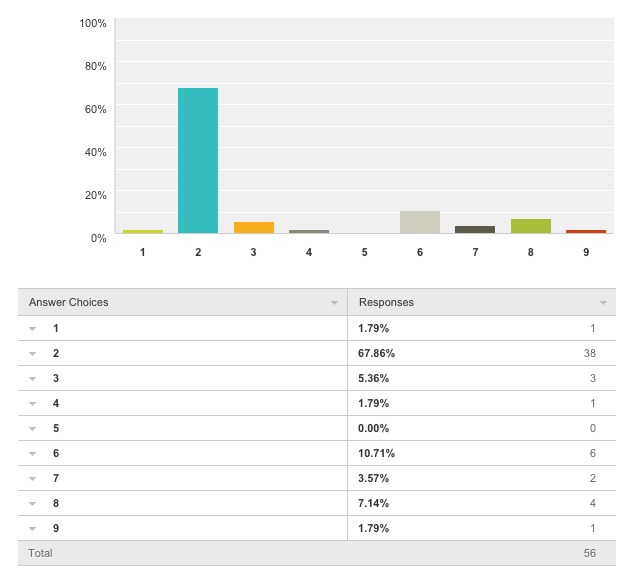
Type 2 ESFJs
Type 2 with a 1 wing: 19%
Type 2 with a 3 wing: 81%
An overwhelming majority of ESFJs selected 2 as their Enneagram type. As this type is strongly correlate with the ESFJ’s dominant function extroverted feeling, this pairing certainly fits.
Type 2 ESFJs tend to be incredibly social, active members of their communities. They believe that they are worthy insofar as they are helpful to others, and will often go far out of their way to lend practical help to loved ones in need. They are likely to require more validation from others than their type 6 counterparts, as their main motivation in life is to feel loved and appreciated by others.
Type 2 ESFJs are constantly moving away from feelings of worthlessness and toward feelings of love, connection and appreciation. They most closely resemble their intuitive cousin the ENFJ.
Type 6 ESFJs
Type 6 with a 5 wing: 67%
Type 6 with a 7 wing: 33%
A small (but nonetheless notable) proportion of ESFJs selected 6 as their Enneagram type. As this type is strongly correlated with the ESFJ’s auxiliary function introverted sensing, this pairing certainly makes sense.
Type 6 ESFJs are similar to their type 2 counterparts in that they are active and diligent members of their communities. They take their personal relationships seriously and are direly loyal to the people they love. For the type 6 ESFJ, however, these relationships are predominantly motivated by their need for support and guidance, as opposed to their need for love and validation. The type 6 ESFJ does not fear that they are unlovable but that they are incapable of providing for themselves. As a result, they entrench themselves deeply in their communities and form meaningful ties with the people and institutions that surround them.
Type 6 ESFJs are constantly moving away from feelings of helplessness and toward feelings of support and external guidance. They are most similar to their introverted-sensing dominant counterparts, ISFJs.
Instinctual Variants:
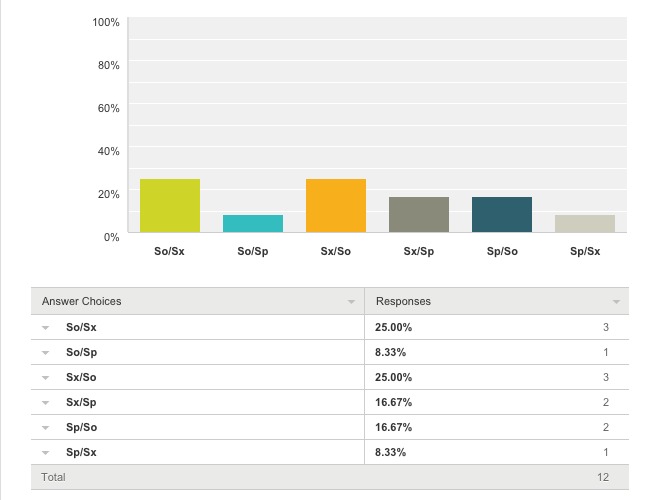
For further commentary on the cognitive functions as they relate to the instinctual variants of the Enneagram, click here. ![]()
Jump to:
Guardians: ISTJ / ISFJ / ESTJ / ESFJ
Artisans: ISFP / ESFP / ISTP / ESTP
Rationals: INTJ / ENTJ / INTP / ENTP
Idealists: INFJ / ENFJ / INFP / ENFP
Cognitive Functions And The Enneagram
ESFPs And The Enneagram
Enneagram Type Distribution
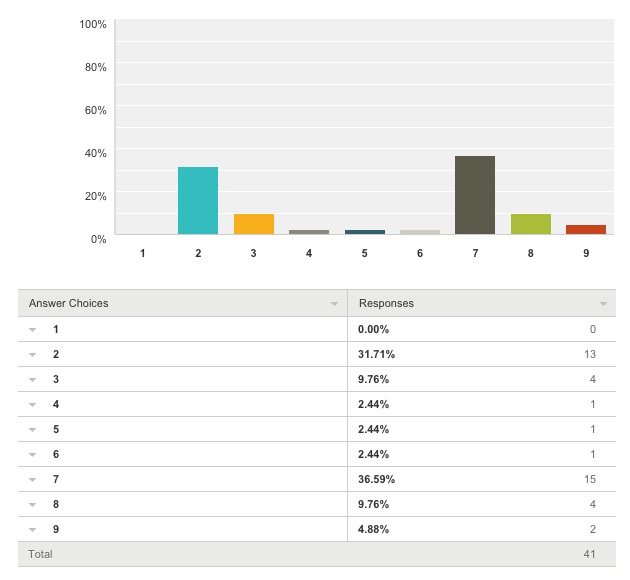
Type 7 ESFPs
Type 7 with a 6 wing: 50%
Type 7 with an 8 wing: 50%
A significant proportion of ESFPs identified 7 as their enneagram type. As extroverted sensing – the ESFP’s dominant function – is strongly correlated with the 7 type, this type pairing comes as little surprise.
Type 7 ESFPs tend to be highly energetic, excitable and sociable. They are constantly on the lookout for new experiences and rely heavily on their extroverted sensing function. Introverted feeling may be somewhat of a blind spot for the type 7 ESFP as they are more interested in taking on new experiences than they are in analyzing them or coming to firm decisions about how they feel. They are prone to pushing any negative feelings under the rug, rather than dealing with them outright.
This type of ESFP lives in a world of endless people possibilities and may jump quickly between relationships, enjoying the intense high of falling in love (or lust). Though they like to surround themselves with people constantly, they are highly independent and self-directed. At their core, the type 7 ESFP believes that they are responsible for going out into the world and getting what they want from it. They are constantly moving away from boredom and deprivation and towards excitement and abundance. They are most like their thinking cousin, the ESTP.
Type 2 ESFPS
Type 2 with a 1 wing: 0%
Type 2 with a 3 wing: 100%
A moderate portion of ESFPs identified 2 as their Enneagram type. Though the 2 type is most commonly associated with the extroverted feeling function, the ESFP’s combination of introverted feeling and extroverted sensing often mimics Fe in many ways. For that reason, it is unsurprising that many ESFPs identify with the 2 type.
Type 2 ESFPs are extremely warm and welcoming – wanting to make others feel comfortable and supported at all costs. Though they are energetic in nature, they are incredibly patient when it comes to supporting the people they love, and make for great listeners and practical problem-solvers. These types will go well out of their way to help the people they love, whether that means offering them practical assistance, taking them out to get their mind off things, or having a long, encouraging conversation about how the other person is feeling. Type 2 ESFPs are often highly in touch with their introverted feeling and are very insightful about the desires, fears and motivations of others.
At their core, the type 2 ESFP believes that they are worthy insofar as they are helpful to others. They are constantly moving away from feelings of insignificance and towards feelings of love and appreciation. They are most like their extroverted-feeling dominant friends, ESFJs.
Instinctual Variants:
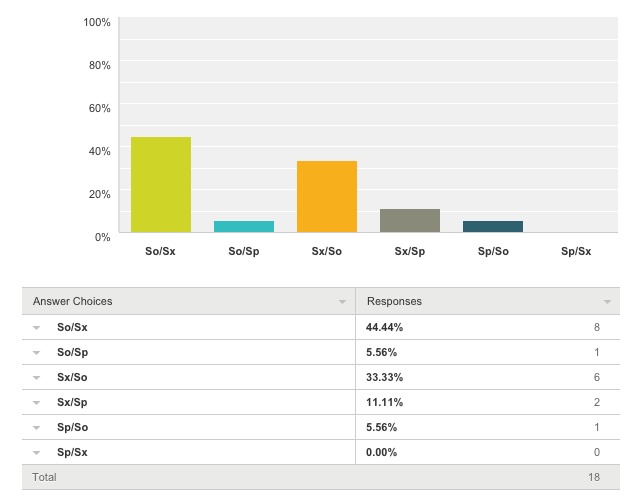
For further commentary on the cognitive functions as they relate to the instinctual variants of the Enneagram, click here. ![]()
Jump to:
Guardians: ISTJ / ISFJ / ESTJ / ESFJ
Artisans: ISFP / ESFP / ISTP / ESTP
Rationals: INTJ / ENTJ / INTP / ENTP
Idealists: INFJ / ENFJ / INFP / ENFP
Cognitive Functions And The Enneagram
INFJs And The Enneagram
Enneagram Type Breakdown
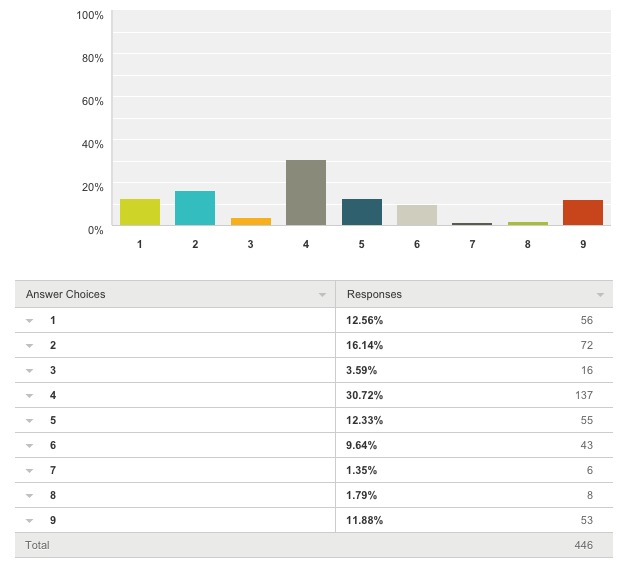
Type 4 INFJs
Type 4 with a 3 wing: 26%
Type 4 with a 5 wing: 74%
A significant proportion of INFJs identified 4 as their Enneagram type. Though the 4 type is most strongly correlated with the introverted feeling cognitive function, it is plausible that the combination of introverted intuition and extroverted feeling could mimic Fi in many ways, resulting in the type 4 INFJ. That being said, it must also be considered that an alarming number of IxFPs tend to mistake themselves for INFJs, which is likely reflected in (and skewing) the survey results.
Because the INFJ type is so rare, many individuals of this type grow up never having met another person like them. Consequently, they may come to base their very identity off the fact that they are unlike everyone else – a trait that is at the core of the individualist type. The type 4 INFJ is likely to distinguish him or herself intellectually – priding themselves on learning, reading about and understanding the world in a more intricate fashion than those around them. This type may have particular trouble exercising their extroverted feeling function, as their individualistic personality prevents them from divulging too much of themselves to others – fearing that if they do, they will be misunderstood by others and viewed in a way that is contrary to their true selves. They may be highly guarded in nature, wanting others only to see their best and most brilliant work, which they are certain reflects their true thoughts.
At their core, the type 4 INFJs believe that they are worthy only insofar as they are fascinating and unique. They are constantly moving away from feelings of worthlessness and toward feelings of individuality. They are most like their Fi-dominant friends the INFPs.
Type 2 INFJs
Type 2 with a 1 wing: 40%
Type 2 with a 3 wing: 60%
A significant proportion of INFJs identified 2 as their Enneagram type. As the 2 type is correlated with the INFJ’s auxiliary function extroverted feeling, this type pairing certainly fits.
Type 2 INFJs are extremely warm and nurturing, wanting the people around them to feel comfortable and supported at all costs. These INFJs are particularly likely to come across as far more extroverted than they truly are, as they tend to overextend themselves socially in an attempt to support all of their loved ones. These INFJs may give and require more validation than their type 9 counterparts, as their sense of self-worth is contingent upon the extent to which they are appreciated by others.
This type is constantly moving away from feelings of uselessness and toward feelings of love and connection. Their extroverted feeling function is likely to be particularly well-developed, and they most closely resemble their extroverted counterpart, the ENFJ.
Type 1 INFJs
Type 1 with a 9 wing: 36%
Type 1 with a 2 wing: 64%
A sizeable portion of INFJs identified 1 as their Enneagram type. Though the 1 type is most commonly associated with the auxiliary extroverted thinking/tertiary introverted feeling axis, it is completely plausible that the combination of dominant introverted intuition and auxiliary extroverted feeling could reflect many type 1 characteristics.
Type 1 INFJs are highly analytical about the world and society they live in – constantly perceiving opportunities for improvement upon the way things are being run. They are likely to be particularly concerned with issues of human rights and are often fierce advocates for the causes they believe in. They are often tirelessly perfectionistic when it comes to their big picture ideals, as nothing ever functions quite as ideally as they can perceive it to. Nonetheless, the type 1 INFJ remains committed to the morals and causes they believe in at all costs. These types often report feeling connected to a higher power or a cause that is greater than themselves, which they must commit themselves and their lives to. In the INFJ’s case this could be either a spiritual power or simply a deeply felt connection to the experience of human suffering.
At their core, type 1 INFJs believe that they are worthy only insofar as they are morally upstanding and virtuous. They are constantly moving away from feelings of corruption and towards feelings of justice and virtuousness. Their heavy reliance on introverted intuition makes them most similar to the INTJ, though the more vocal type 1 INFJs may also be mistaken for extroverts.
Type 5 INFJs
Type 5 with a 4 wing: 74%
Type 5 with a 6 wing: 26%
A decent proportion of INFJs identified 5 as their Enneagram type. The 5 type is most strongly correlated with the INFJ’s tertiary function introverted thinking, but seems to also have a correlation with their dominant function, introverted intuition. In either case, it is unsurprising that many INFJs identify as such.
Type 5 INFJs are likely to be fairly serious in nature and slightly more reserved than their type 2 or type 1 counterparts. As they dwell primarily in their introverted intuition, they will likely hold back on acting in most situations until they have analyzed it as thoroughly as possible, from every available angle. They may consequently experience their extroverted feeling to be somewhat of a blind spot for them.
Type 5 INFJs believe, at their core, that they are worthy insofar as they are competent and capable. They are constantly moving away from feelings of helplessness and toward feelings of understanding. They are most similar in nature to their thinking cousin, the INTJ.
Instinctual Variants:
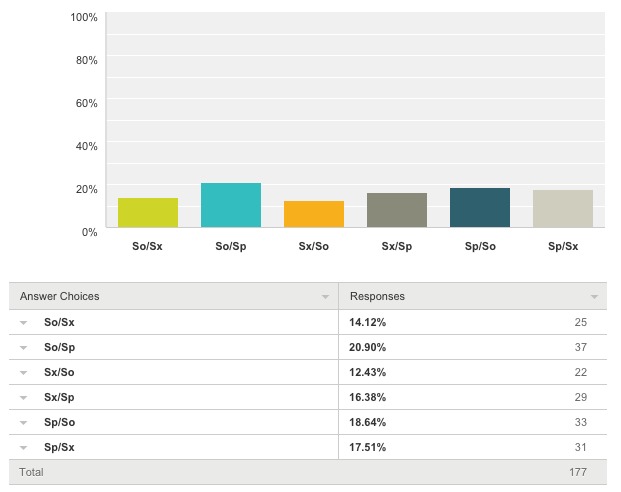
For further commentary on the cognitive functions as they relate to the instinctual variants of the Enneagram, click here. ![]()
Jump to:
Guardians: ISTJ / ISFJ / ESTJ / ESFJ
Artisans: ISFP / ESFP / ISTP / ESTP
Rationals: INTJ / ENTJ / INTP / ENTP
Idealists: INFJ / ENFJ / INFP / ENFP
Cognitive Functions And The Enneagram
ENFJs And The Enneagram
Enneagram Type Distribution:
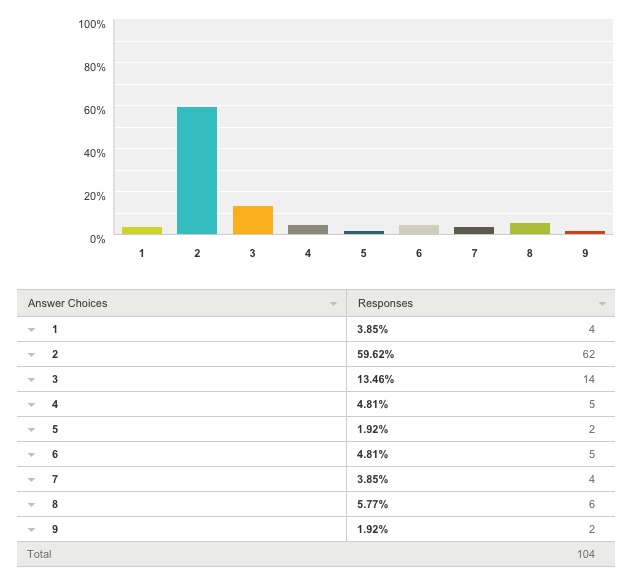
Type 2 ENFJs
Type 2 with a 1 wing: 13%
Type 2 with a 3 wing: 87%
An overwhelming number of ENFJ respondents identified 2 to be their Enneagram type. Since the 2 type is highly correlated with the ENFJ’s dominant function extroverted feeling, it is wholly unsurprising that the majority of them identified their Enneagram type as such.
Type 2 ENFJs are highly outgoing, sociable and friendly in nature. They tend to be active members of their community and are often heavily involved with charity work or helping professions. Being intuitive-auxiliary types, the ENFJ will aim to provide assistance to those around them not just in a practical sense but on a deep emotional level. They will strive to get others open up to them about their vulnerabilities and struggles, in order to help them sort through their complex emotional problems.
At their core, the type 2 ENFJ believes that they are worthy only insofar as they are helpful to others. They are constantly moving away from feelings of uselessness and towards feelings of love, validation and acceptance. They are most similar in nature to their sensing cousin-type, the ESFJ.
Type 3 ENFJs
Type 3 with a 2 wing: 56%
Type 3 with a 4 wing: 44%
A sizeable portion of ENFJs identified 3 as their Enneagram type. Though this type is primarily correlated with the cognitive function of extroverted thinking, it is perfectly plausible that an extroverted-feeling dominant type would internalize the values of their community in such a way that would lead them to take on type 3 characteristics.
Type 3 ENFJs are highly organized, motivated and achievement-oriented. They are bright and charming, using their interpersonal skills to help them rise naturally into leadership roles. These ENFJs will take particular pride in serving as a role model for others. They are likely to be well known and highly respected within their community.
At their core, type 3 ENFJs believe that they are worthy only insofar as they are accomplished in others’ eyes. They are constantly striving to move away from feelings of worthlessness and towards feelings of impressiveness and achievement. They are most similar to their thinking-dominant cousin type, the ENTJ.
Instinctual Variants:
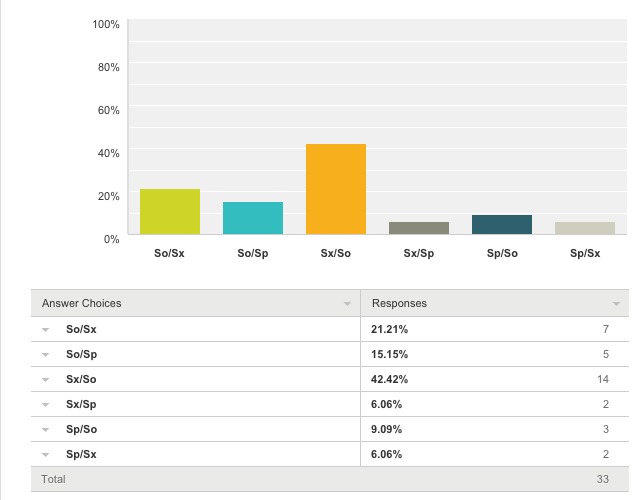
For further commentary on the cognitive functions as they relate to the instinctual variants of the Enneagram, click here. ![]()
Jump to:
Guardians: ISTJ / ISFJ / ESTJ / ESFJ
Artisans: ISFP / ESFP / ISTP / ESTP
Rationals: INTJ / ENTJ / INTP / ENTP
Idealists: INFJ / ENFJ / INFP / ENFP
Cognitive Functions And The Enneagram
INFPs And The Enneagram
Enneagram Type Distribution:
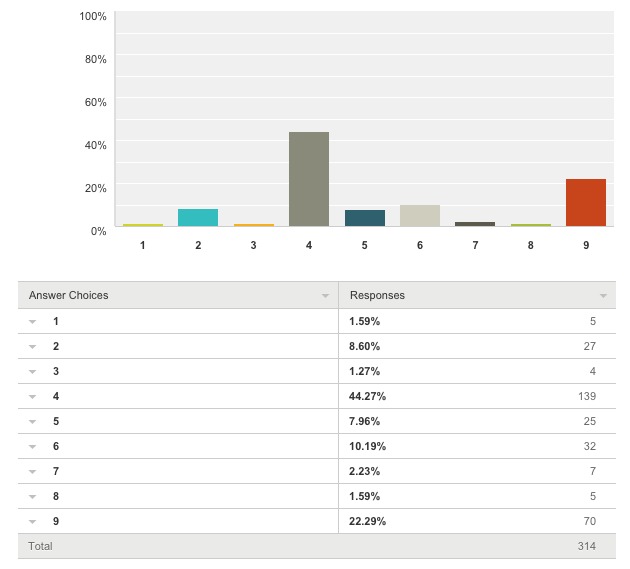
Type 4 INFPs
Type 4 with a 3 wing: 24%
Type 4 with a 5 wing: 76%
An overwhelming number of INFPs selected 4 as their Enneagram type. As this type is correlated with the introverted feeling function, this type pairing certainly makes sense.
Type 4 INFPs are highly in touch with their dominant introverted feeling function, which allows them to experience life on a deeply emotional level. Creative and individualistic to the core, this type makes up many of the writers, philosophers and artists of the world. The type 4 INFP is governed by the pervasive, deep-seated belief that nobody else truly understands his or her authentic self. They may turn to creative expression in an attempt to communicate the depths of their thoughts and feelings, but they paradoxically never want to completely reveal themselves, as the existence of their rich inner world is the very thing that they believe sets them apart from everyone else.
At their core, type 4 INFPs believe that they are worthy only insofar as they are interesting and unique. They are constantly moving away from feelings of inadequacy and toward feelings of individuality and authenticity. Many type 4 INFPs tend to mistake themselves for INFJs (particularly if they test as such using an online assessment), as they mistake the INFJ’s statistical rarity for the reason why they feel so different from those around them.
Type 9 INFPs
Type 9 with an 8 wing: 15%
Type 9 with a 1 wing: 85%
A moderate number of INFPs selected 9 as their Enneagram type. As this type is correlated with the INFP’s dominant function, introverted feeling, this pairing certainly fits.
Type 9 INFPs seek personal and interpersonal peace above all else. They are motivated by an inherent fear of losing touch with both themselves and those around them – striving endlessly to remain authentically connected to the people and things that they love. These INFPs tend to be spiritual in nature and often report feeling connected to a higher power – which could be anything from a traditional religious entity to an earthly flow of energy that connects people to one another or to nature.
At their core, type 9 INFPs believe that they are worthy only insofar as they are in touch with their inner selves and the people around them. They are constantly moving away from feelings of loss or disconnection and toward feelings of harmony and peace. This type is most like their sensing cousin, the ISFP.
Type 6 INFPs
Type 6 with a 5 wing: 75%
Type 6 with a 7 wing: 25%
A moderate number of INFPs identified 6 as their Enneagram type. Though this type is most strongly correlated with the INFP’s tertiary function introverted sensing, it also seems to have a slight correlation with the dominant introverted feeling/inferior extroverted thinking axis.
The type 6 INFP is likely to have a volatile relationship with his or her tertiary and inferior functions – craving security, but feeling inherently unable to provide it for him or herself. To compensate, the INFP seeks out friends, partners and mentors who can provide them with support and guidance. They are likely to form deep, long-lasting relationships with friends, community members and partners whom they remain extremely loyal to at all costs. This strategy works well with the INFP’s dominant introverted feeling function, which craves deep, lasting relationships.
At their core, the type 6 INFP believes that they are safe and secure only insofar as they are connected to and supported by others. They are constantly moving away from feelings of helplessness and towards feelings of guidance, inclusion and support. They are most similar in nature to the ISFJ personality type.
Instinctual Variants:
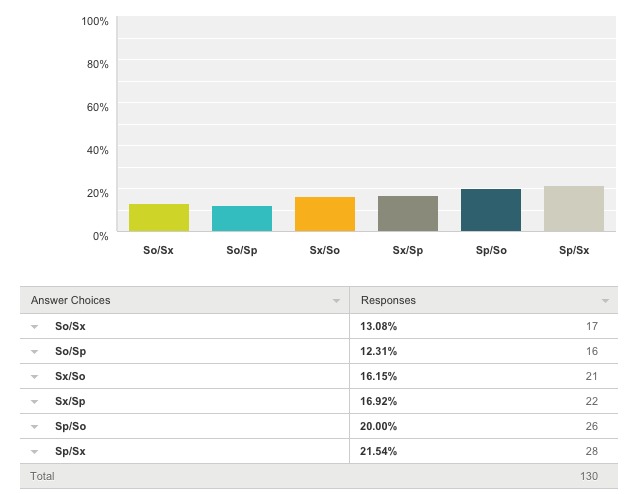
For further commentary on the cognitive functions as they relate to the instinctual variants of the Enneagram, click here. ![]()
Jump to:
Guardians: ISTJ / ISFJ / ESTJ / ESFJ
Artisans: ISFP / ESFP / ISTP / ESTP
Rationals: INTJ / ENTJ / INTP / ENTP
Idealists: INFJ / ENFJ / INFP / ENFP
Cognitive Functions And The Enneagram
ENFPs And The Enneagram
Enneagram Type Distribution:
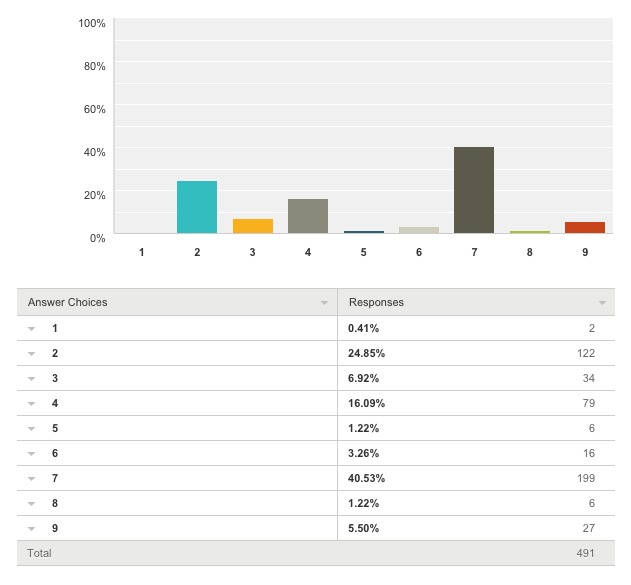
Type 7 ENFPs
Type 7 with a 6 wing: 46%
Type 7 with an 8 wing: 54%
The majority of ENFPs identified themselves as 7s in the Enneagram system. Since dominant extroverted intuition seems to be correlated with the 7 type, this is little surprise. Both ENFPs and Type 7s are characterized as being future-oriented novelty seekers, who dislike routine and are attracted to intensity. The ENFP type 7 may find themselves particularly attracted to emotional intensity, though they may experience difficulty maintaining close relationships, as their desire for novelty keeps them constantly on the move.
Type 7 ENFPs are likely to be particularly heavy on extroverted intuition and extroverted thinking and may find introverted feeling to be their blind spot in their stacking. Type 7s tend to avoid processing negative emotions, which may cause the ENFP to repress many of their deeply-felt experiences of sadness or pain. These ENFPs are the ones who are constantly looking for the next great challenge, adventure or thrill. They are often avid travelers or adventurers, who may be mistaken for ESFPs or ESTPs by others (due to their bold, adventurous nature) and may misidentify themselves as ENTPs (due to introverted feeling being a blind spot for them).
Type 4 ENFPs
Type 4 with a 3 wing: 65%
Type 4 with a 5 wing: 35%
A substantial number of ENFPs identified themselves as 4s in the Enneagram system. Since the 4 type seems to be correlated with the introverted feeling function, it makes sense that this Fi-auxiliary type identifies as such. Both type 4s and ENFPs are characterized by their fierce individuality, their emotional intensity their creativity and their intuitive understanding of emotional processes.
Type 4 ENFPs are likely to be particularly in touch with their introverted feeling function, using extroverted intuition as more of a muse than a driving force. These ENFPs are often highly creative, artistic and individualistic, feeling proud of their own emotional intensity. This type’s blind spot is likely to be extroverted thinking, as they may fear losing their authenticity through the employment of Te. Type 4 ENFPs make up many of the poets, musicians and artists of the world and they are most likely to be mistaken for INFPs (due to their deep, brooding nature). This type is also highly likely to misidentify themselves as INFPs, as they are so deeply in touch with their introverted feeling function.
Type 2 ENFPs
Type 2 with a 1 wing: 14%
Type 2 with a 3 wing: 86%
A sizeable number of ENFPs identified themselves as Enneagram 2s. Though this Enneagram type is most heavily correlated with the extroverted feeling function, it follows that an ENFP who has adopted ‘helping others’ as one of their primary morals would identify as this type. Both ENFPs and Type 2s are characterized by their people-oriented nature, their compassion for others, their desire for close relationships and their advocacy for those who are disadvantaged.
Type 2 ENFPs are likely to be particularly in touch with their introverted feeling function and they may identify as highly sensitive people or empaths. These ENFPs are deeply in tune with the feelings of those around them and may often find themselves taking on the burdens of others as their own. For type 2 ENFPs, the development of extroverted thinking will be particularly useful in helping them set boundaries and managing their sense of empathy. These ENFPs may be mistaken for ENFJs by others (as their helpful nature mimics extroverted feeling) but are more likely to misidentify themselves as INFPs as they are so deeply in touch with their introverted feeling function.
Instinctual Variants:
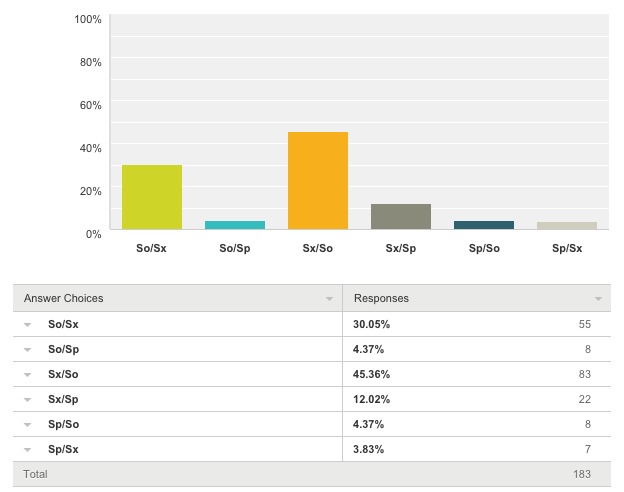
For further commentary on the cognitive functions as they relate to the instinctual variants of the Enneagram, click here. ![]()
Jump to:
Guardians: ISTJ / ISFJ / ESTJ / ESFJ
Artisans: ISFP / ESFP / ISTP / ESTP
Rationals: INTJ / ENTJ / INTP / ENTP
Idealists: INFJ / ENFJ / INFP / ENFP
Cognitive Functions And The Enneagram
Heidi Priebe explains how to manage the ups, downs and inside-outs of everyday life as an ENFP in her new book available here.

Cognitive Functions And The Enneagram
Extroverted Intuition (Ne)
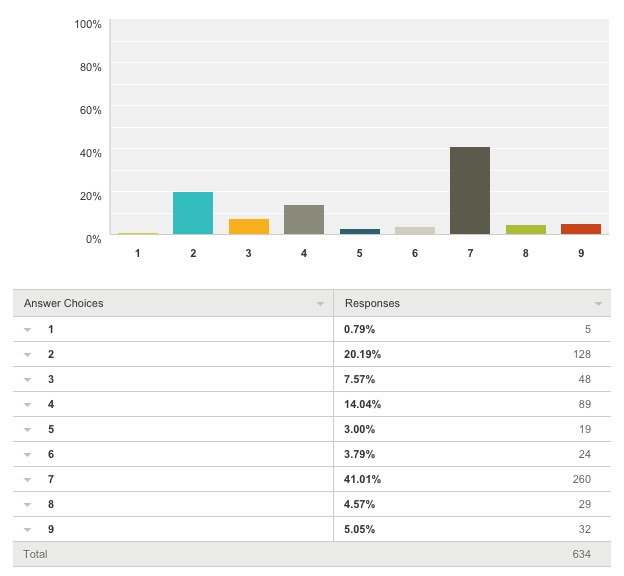
Enneagram Type:
When the scores for the two intuitive-dominant types (ENFP and ENTP) were combined, both showed a strong inclination toward the 7 type. The 7 type is characterized by a high need for stimulation, a heavy focus on exciting future possibilities and a strong dislike of being constrained or held back, all of which are traits that fall neatly in line with the cognitive function extroverted intuition.
Though the 4 and 2 types also showed a slight correlation with extroverted intuition, these were mostly results from ENFP respondents and the correlation was likely due to the influence of introverted feeling on the ENFP, rather than extroverted intuition alone.
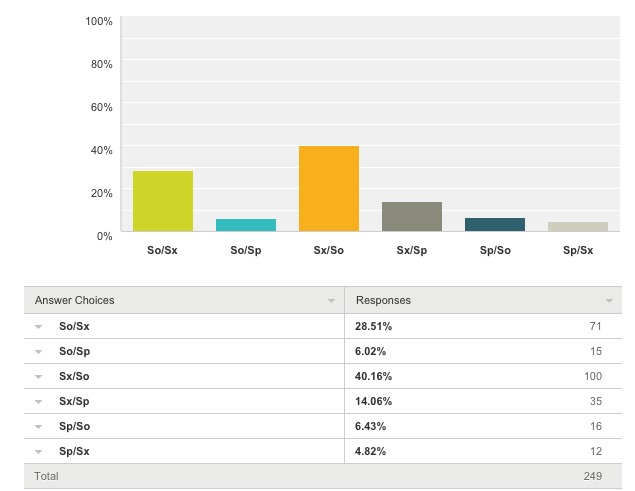
Instinctual Variants:
Ne-dominant types displayed a preference for the sexual and social instinctual variants. Both the sexual variant and extroverted intuition are characterized by a thirst for intense experiences and the desire to feel deeply engaged with life. Both the social instinct and extroverted intuition are characterized by the desire to understand others on a deep level, and to find one’s individual place within society or a given group of people.
Introverted Intuition (Ni)
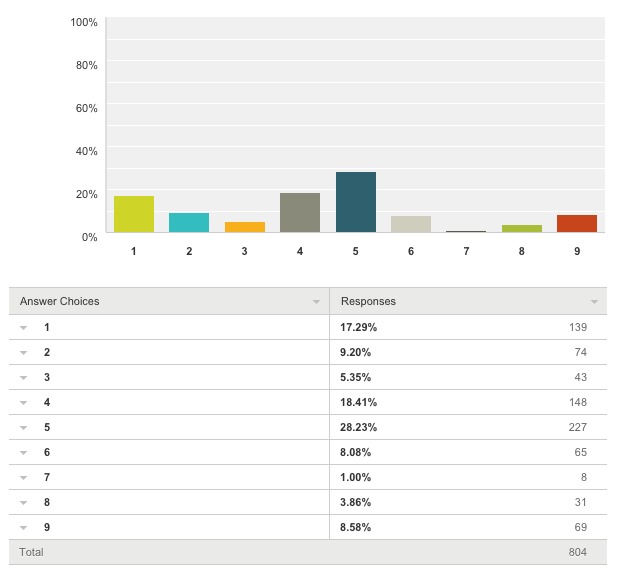
Enneagram Type:
INFJs and INTJs display an inclination toward the 5 type. Both the 5 type and the introverted intuition cognitive function are characterized by the desire to understand a situation from every possible angle and they both value competence above all else. A moderate preference for the 1 type was also selected by both Ni-dominant types, and though the 4 type ranked highly in the above chart, the 4 type was selected almost solely by INFJs respondents, indicating that it may only be correlated with Ni if combined with the extroverted feeling/introverted thinking axis.
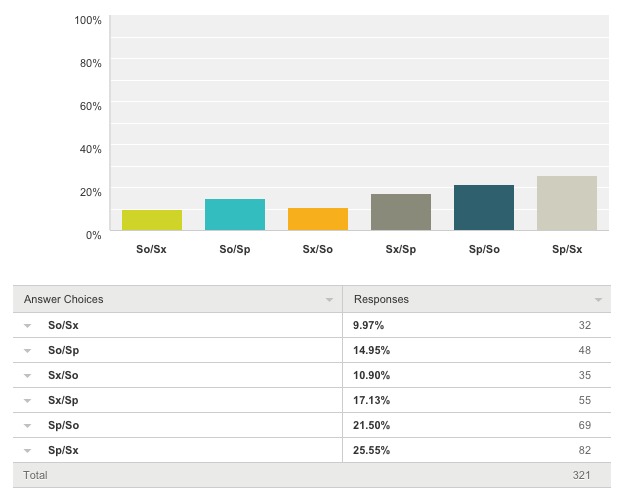
Instinctual Variants:
Though results were dispersed somewhat evenly in terms of instinctual variant preferences for Ni-dominant types, a slight preference for the self-preservation instinct was shown across the board. Both introverted intuition and the self-preservation instinct are characterized by the desire to provide for oneself and obtain an understanding of one’s environment and how to best navigate it.
Extroverted Sensing (Se)
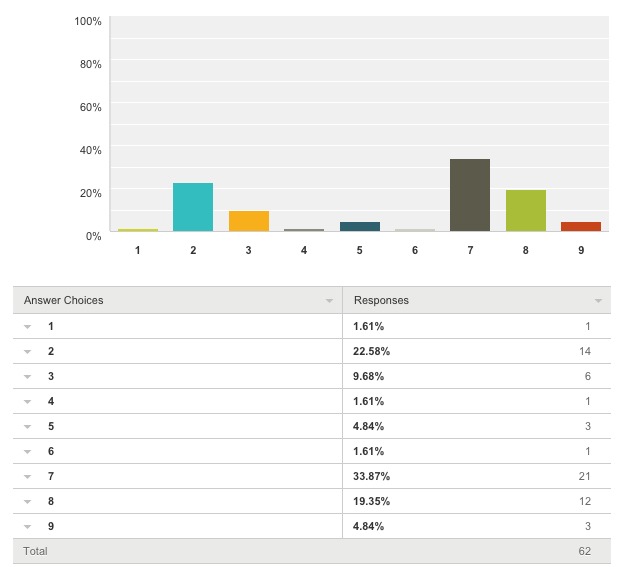
Enneagram Type:
Both ESFPs and ESTPs displayed a strong inclination toward the 7 type. Both extroverted sensing and the 7 type are characterized by an intense desire for stimulation and a heavy engagement with one’s external environment. Types 2 and 8 are also displayed as strong correlates in the chart above, however the 2 type was selected almost entirely by ESFPs whereas the 8 type was selected almost entirely by ESTPs – indicating that these types may have more to do with the combination of Se+Fi and Se+Ti respectively, rather than Se alone.
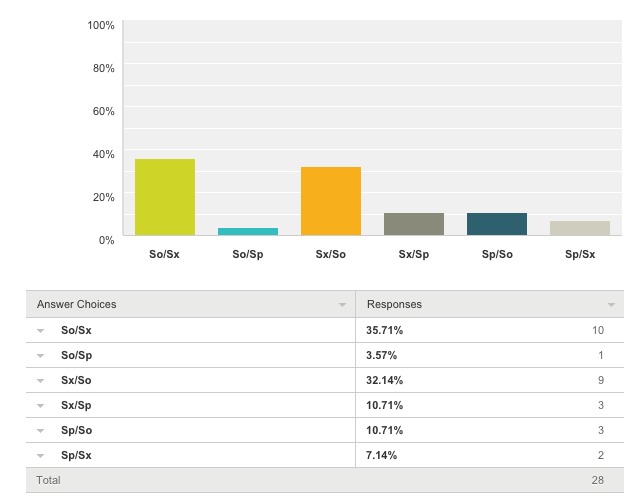
Instinctual Variants:
ESFPs and ESTPs displayed a strong preference for the sexual and social instincts. Both extroverted sensing and the sexual instinct are characterized by the need to be deeply and intimately engaged with one’s external environment, whereas both extroverted sensing and the social instinct are characterized by the need to be in tune with what is going on around the user at all times and to be actively engaged in their social environment.
Introverted Sensing (Si)
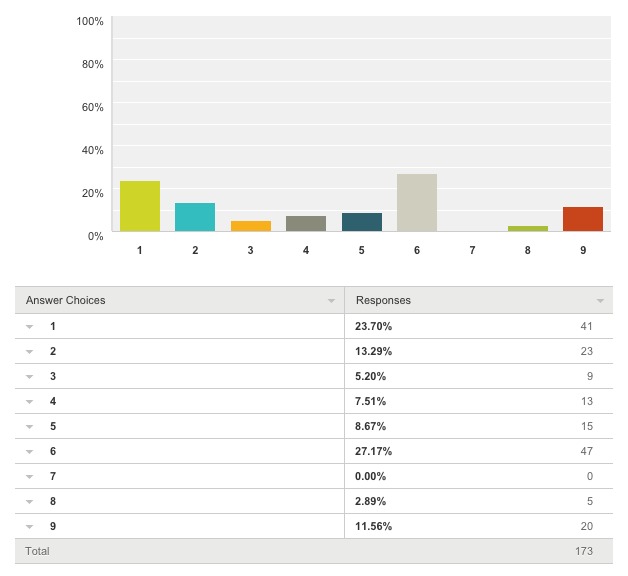
Enneagram Type:
ISFJs and ISTJs indicated a strong preference for the 6 Enneagram type. Both introverted sensing and the 6 type are characterized by the desire to retain the most reliable information that exists in their external environment as a means of maintaining personal security. Type 1 was a common choice for ISTJ respondents and types 2 and 9 were common choices for ISFJs, however these likely had to do with the combination of Si with one’s auxiliary and tertiary function than Si alone.
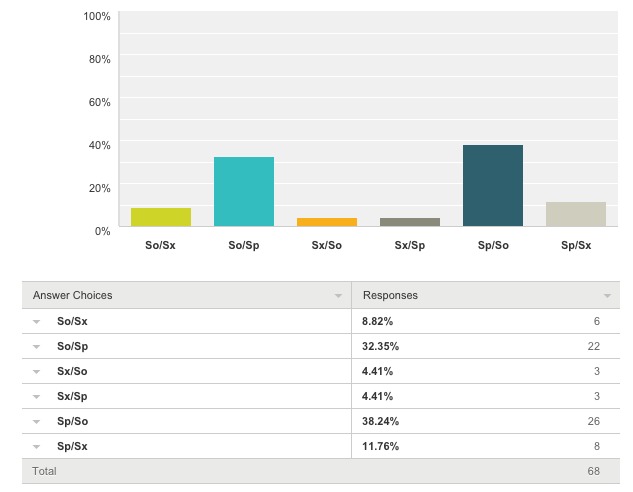
Instinctual Variants:
Introverted sensing dominant types indicated a strong preference for the self preserving and social variants. Both introverted sensing and the self preservation instinct are characterized by the tendency to be highly in tune with one’s physical environment and to understand how to best navigate it in order to remain secure. Both introverted sensing and the social instinct are characterized by the desire to understand one’s natural place within society and to follow the social rules that are already at play.
Extroverted Thinking (Te)
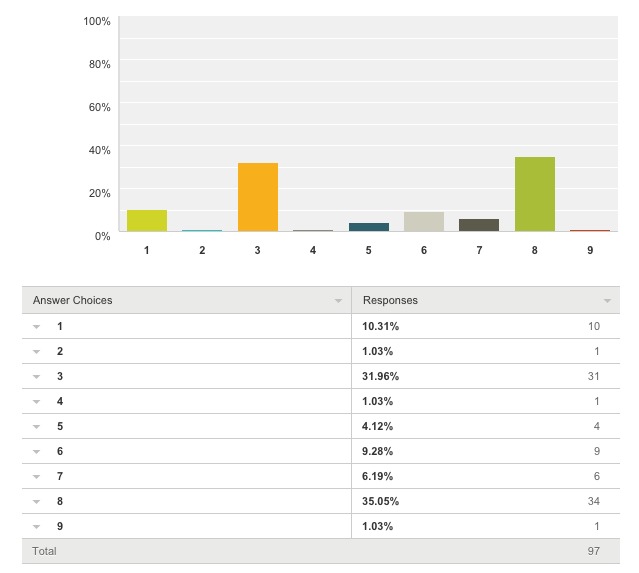
Enneagram Type:
ESTJs and ENTJs displayed a strong preference for the 8 and 3 Enneagram types. Both extroverted thinking and the 8 type are characterized by the strong desire to control one’s external environment in a fashion that is directly beneficial to the user. Both extroverted thinking and the 3 type are characterized by the tendency to be highly ambitious and achievement-oriented.
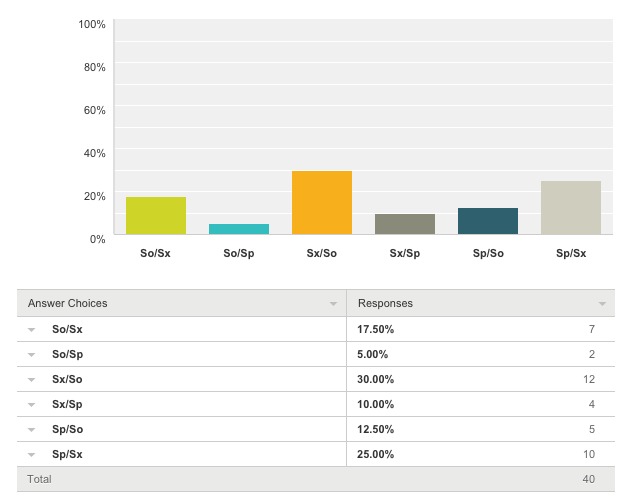
Instinctual Variants:
Extroverted thinking did not display any particularly notable correlations with the instinctual variants. However, both ESTJs and ENTJs did show a slight preference for having the sexual instinct in their top two variant stacking. Extroverted thinking and the sexual variant are both characterized by the presence of a personal intensity that drives much of the user’s behaviour as it relates to their external environment.
Introverted Thinking (Ti)
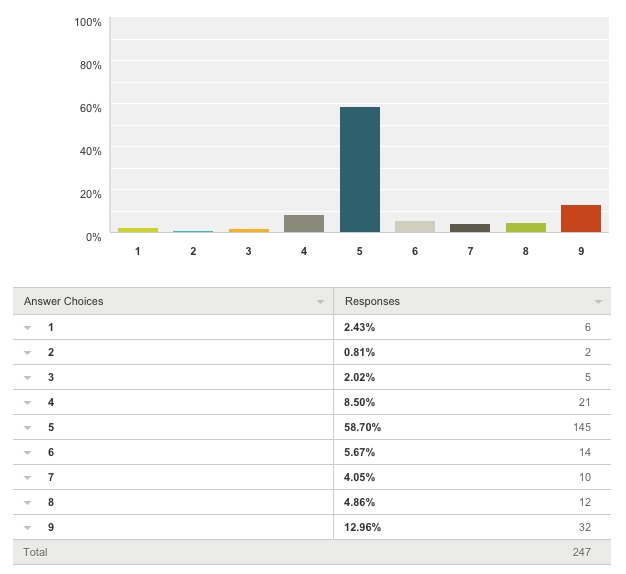
Enneagram Type:
INTPs and ISTPs displayed an overwhelming preference for the 5 type. Both introverted thinking and the 5 type are characterized by the desire to understand their external environment in a comprehensive fashion. Both types also displayed a slight preference for the 9 type. While introverted thinking itself does not mimic many traits of the 9 type, the ISTP and INTP’s inferior function, extroverted feeling, often manifests as a desire for peace and connection, which is a key trait of the 9 type.
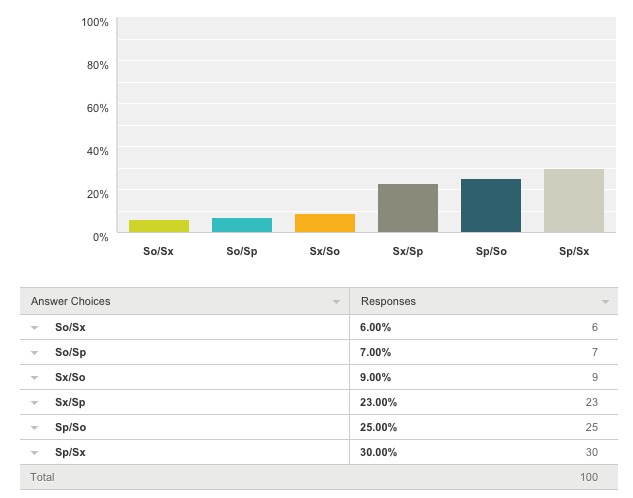
Instinctual Variants:
ISTPs and INTPs displayed a moderate preference for both the self-preservation instinct and the sexual instinct. Both introverted thinking and the self-preservation instinct are characterized by the desire to remain competent and capable in relation to one’s external environment. Both introverted thinking and the sexual variant are characterized by an intense captivation with any topic or situation that catches the user’s interest.
Extroverted Feeling (Fe)
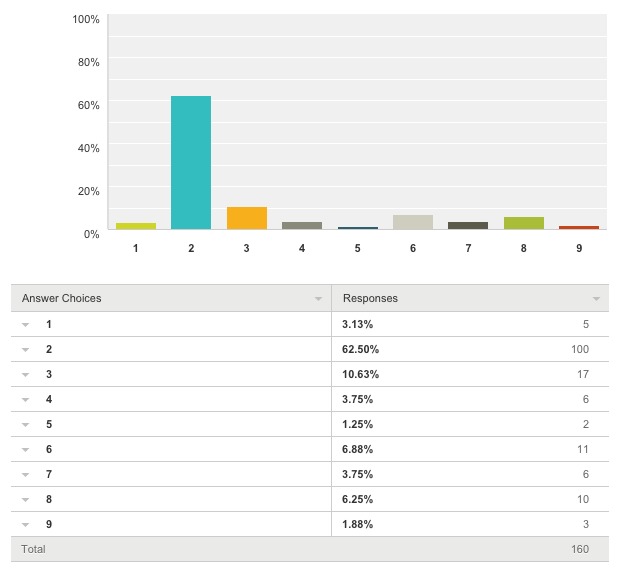
Enneagram Type:
ESFJs and ENFJs displayed an overwhelming identification with the 2 type. Both extroverted feeling and the 2 type are characterized by the desire to help and nurture others as a means of achieving social and emotional security.
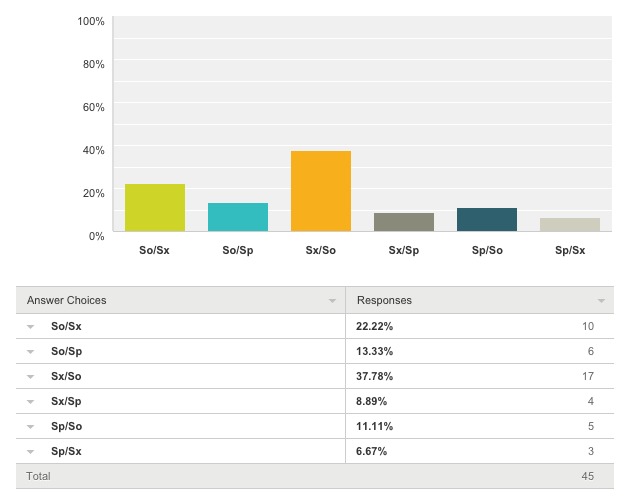
Instinctual Variants:
ESFJs and ENFJs displayed strong preferences for the sexual and social variants. Both extroverted feeling and the sexual variant are characterized by an intense desire for emotional intimacy and closeness. Both extroverted feeling and the social variant are characterized by the desire to find one’s place within social systems and remain connected and in tune with the people in one’s environment.
Introverted Feeling (Fi)
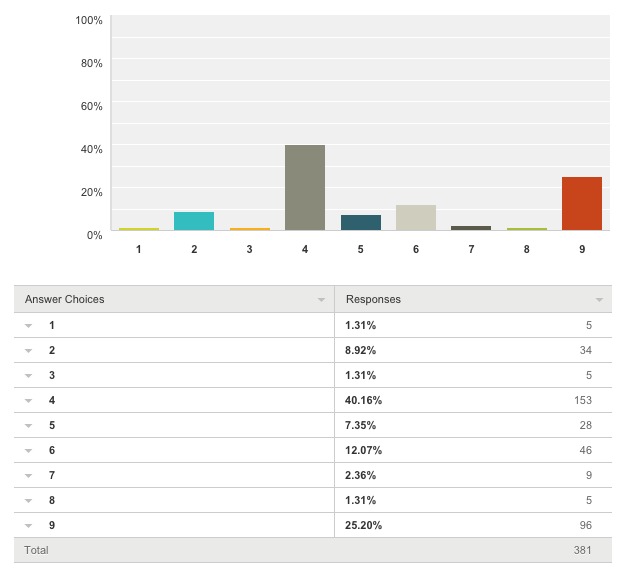
Enneagram Type:
ISFPs and INFPs displayed strong preferences for the 4 and 9 Enneagram types. Both introverted feeling and the 4 type are characterized by an emotional intensity that is highly personal and individualistic. Both introverted feeling and the 9 type are characterized by the desire for internal and interpersonal peace and harmony.
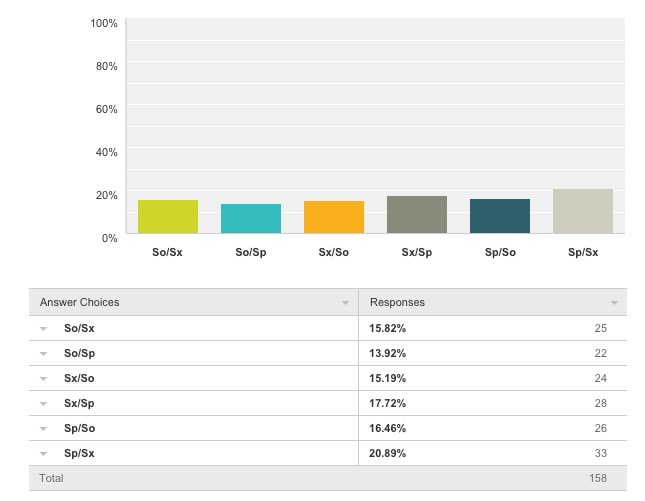
Instinctual Variants:
Interestingly, the introverted feeling function displayed almost no correlation to any particular instinctual variants. ![]()
Jump to:
Guardians: ISTJ / ISFJ / ESTJ / ESFJ
Artisans: ISFP / ESFP / ISTP / ESTP
Rationals: INTJ / ENTJ / INTP / ENTP
Idealists: INFJ / ENFJ / INFP / ENFP











